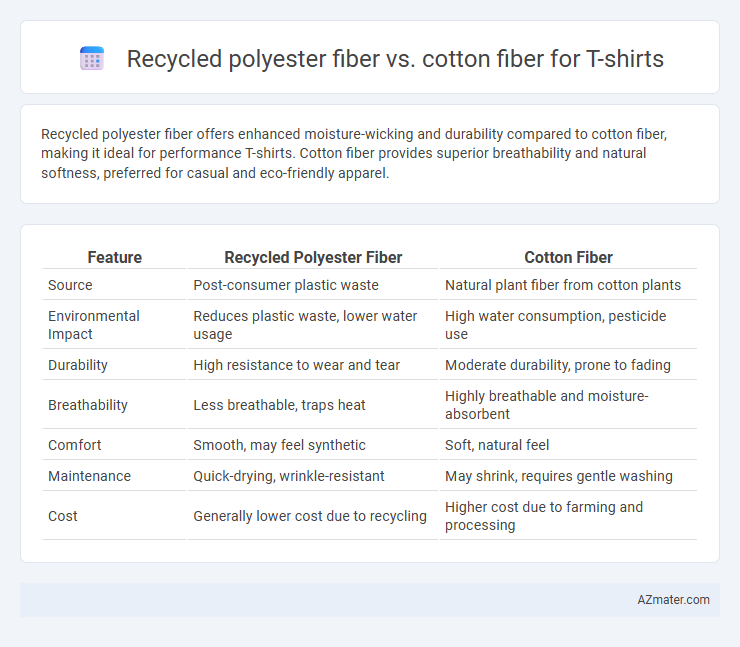Recycled polyester fiber offers enhanced moisture-wicking and durability compared to cotton fiber, making it ideal for performance T-shirts. Cotton fiber provides superior breathability and natural softness, preferred for casual and eco-friendly apparel.
Table of Comparison
| Feature | Recycled Polyester Fiber | Cotton Fiber |
|---|---|---|
| Source | Post-consumer plastic waste | Natural plant fiber from cotton plants |
| Environmental Impact | Reduces plastic waste, lower water usage | High water consumption, pesticide use |
| Durability | High resistance to wear and tear | Moderate durability, prone to fading |
| Breathability | Less breathable, traps heat | Highly breathable and moisture-absorbent |
| Comfort | Smooth, may feel synthetic | Soft, natural feel |
| Maintenance | Quick-drying, wrinkle-resistant | May shrink, requires gentle washing |
| Cost | Generally lower cost due to recycling | Higher cost due to farming and processing |
Introduction to T-Shirt Fiber Choices
Recycled polyester fiber offers enhanced durability, moisture-wicking properties, and environmental benefits compared to traditional cotton fiber, which is valued for its softness, breathability, and natural comfort. Choosing between recycled polyester and cotton depends on priorities such as sustainability, performance, and tactile feel in T-shirt production. Advances in textile technology continue to improve recycled polyester's appeal by reducing microplastic pollution and energy consumption during manufacturing.
What is Recycled Polyester Fiber?
Recycled polyester fiber is a sustainable textile material made by processing plastic waste, such as PET bottles, into new polyester fibers suitable for fabric production. Compared to cotton fiber, recycled polyester reduces environmental impact by minimizing plastic pollution and conserving water and energy during manufacturing. This fiber offers durability, moisture-wicking properties, and quicker drying times, making it an eco-friendly alternative for T-shirt production.
Understanding Cotton Fiber
Cotton fiber, a natural cellulose fiber derived from the cotton plant, offers breathability, softness, and moisture absorption, making it ideal for comfortable T-shirts. Its biodegradable nature and renewable sourcing contrast with recycled polyester fiber, which is synthetic and derived from post-consumer plastics, offering durability and moisture-wicking properties. Understanding cotton fiber's environmental impact involves considering water usage and pesticide application during cultivation, which differ significantly from the recycled polyester production process.
Environmental Impact: Recycled Polyester vs Cotton
Recycled polyester fiber significantly reduces water consumption and greenhouse gas emissions compared to cotton fiber, using approximately 75% less water and emitting up to 60% fewer CO2 emissions during production. Cotton cultivation requires large amounts of water, pesticides, and land, contributing to soil degradation and biodiversity loss. Choosing recycled polyester for T-shirts minimizes environmental impact through resource conservation and reduced pollution, supporting sustainable fashion initiatives.
Comfort and Wearability Comparison
Recycled polyester fiber offers superior moisture-wicking and quick-drying properties compared to cotton fiber, enhancing comfort during physical activities and in humid conditions. Cotton fiber, known for its natural breathability and softness, provides a more breathable and skin-friendly feel, making it ideal for casual wear. While recycled polyester fibers excel in durability and shape retention, cotton fibers typically offer better temperature regulation and comfort in everyday use.
Durability and Longevity
Recycled polyester fiber exhibits superior durability and longevity compared to cotton fiber due to its resistance to shrinking, stretching, and abrasions, making it ideal for high-performance T-shirts. Cotton fibers tend to weaken and degrade faster after repeated washing and wearing, resulting in shorter garment lifespan. Choosing recycled polyester enhances sustainability by extending the usable life of T-shirts while reducing environmental impact.
Moisture Management and Breathability
Recycled polyester fiber excels in moisture management by rapidly wicking sweat away from the skin and drying quickly, making it ideal for activewear T-shirts. Cotton fiber offers superior breathability and natural softness but tends to retain moisture, which can lead to a damp, heavy feel during intense physical activity. Combining recycled polyester's moisture-wicking properties with cotton's breathability often results in a balanced fabric blend suitable for versatile T-shirt performance.
Cost Analysis: Recycled Polyester vs Cotton
Recycled polyester fiber generally costs less to produce than cotton fiber due to lower water usage and reduced agricultural inputs, making it a more economical choice for T-shirt manufacturing. Cotton fiber involves higher costs associated with water consumption, pesticides, and labor, which drives up its overall price. Additionally, recycled polyester benefits from lower transportation expenses and faster production cycles, further enhancing cost efficiency compared to cotton.
Fashion and Design Flexibility
Recycled polyester fiber offers superior design flexibility compared to cotton fiber due to its enhanced durability, resistance to shrinking, and vibrant color retention, making it ideal for fashion designers seeking innovative textures and patterns. The synthetic nature of recycled polyester allows for diverse fabric finishes, including stretchability and moisture-wicking properties, which cotton fibers inherently lack. Cotton fibers provide natural breathability and softness but can limit intricate design possibilities due to their tendency to wrinkle and shrink after washing.
Which Fiber is Better for Sustainable T-Shirts?
Recycled polyester fiber reduces waste by repurposing plastic bottles, consumes less water than cotton, and lowers greenhouse gas emissions, making it a more sustainable choice for T-shirts. Cotton fiber, while biodegradable and breathable, requires extensive water usage and pesticide application, raising environmental concerns. Choosing recycled polyester supports circular economy principles, whereas cotton's sustainability improves with organic and regenerative farming practices.

Infographic: Recycled polyester fiber vs Cotton fiber for T-shirt
 azmater.com
azmater.com